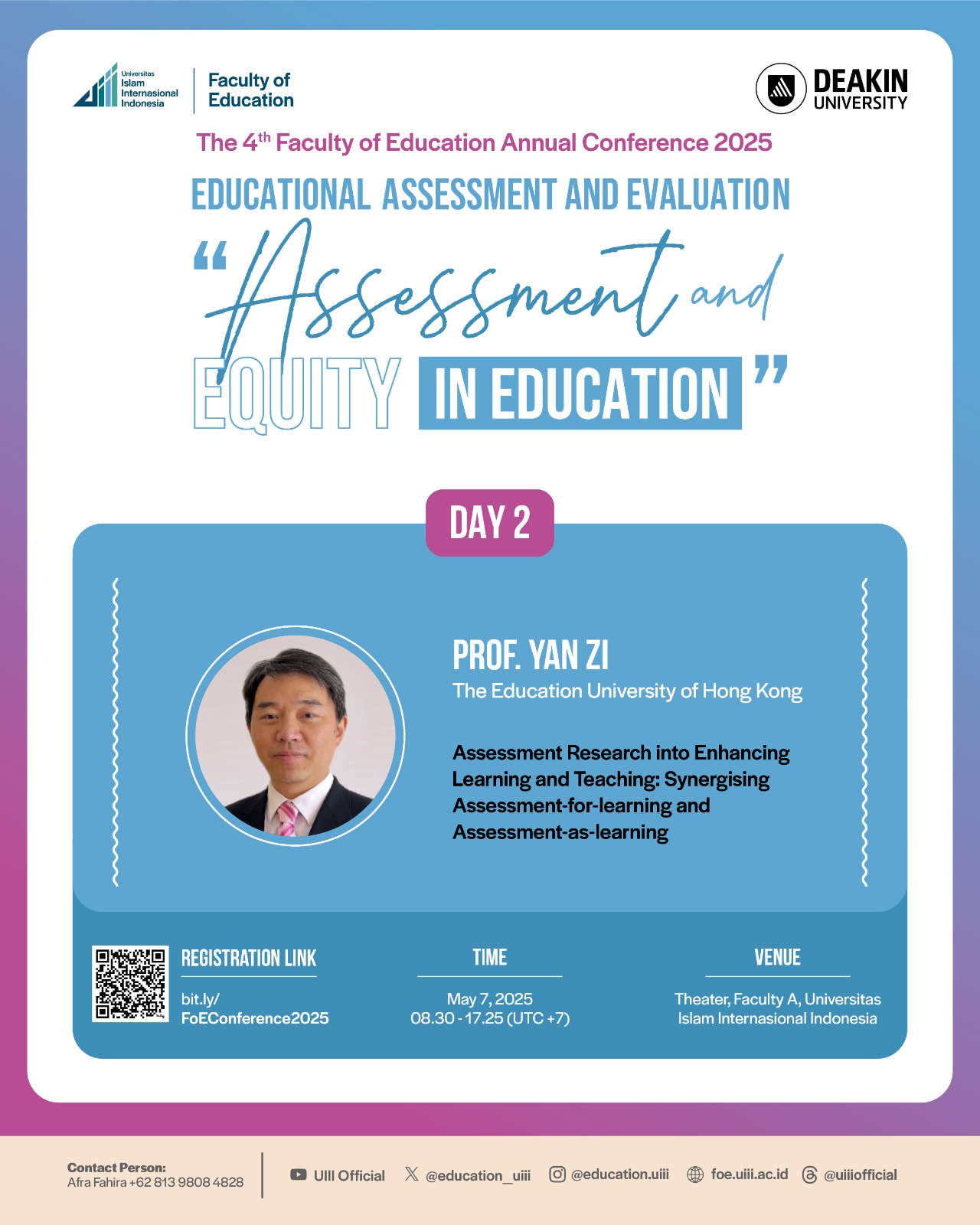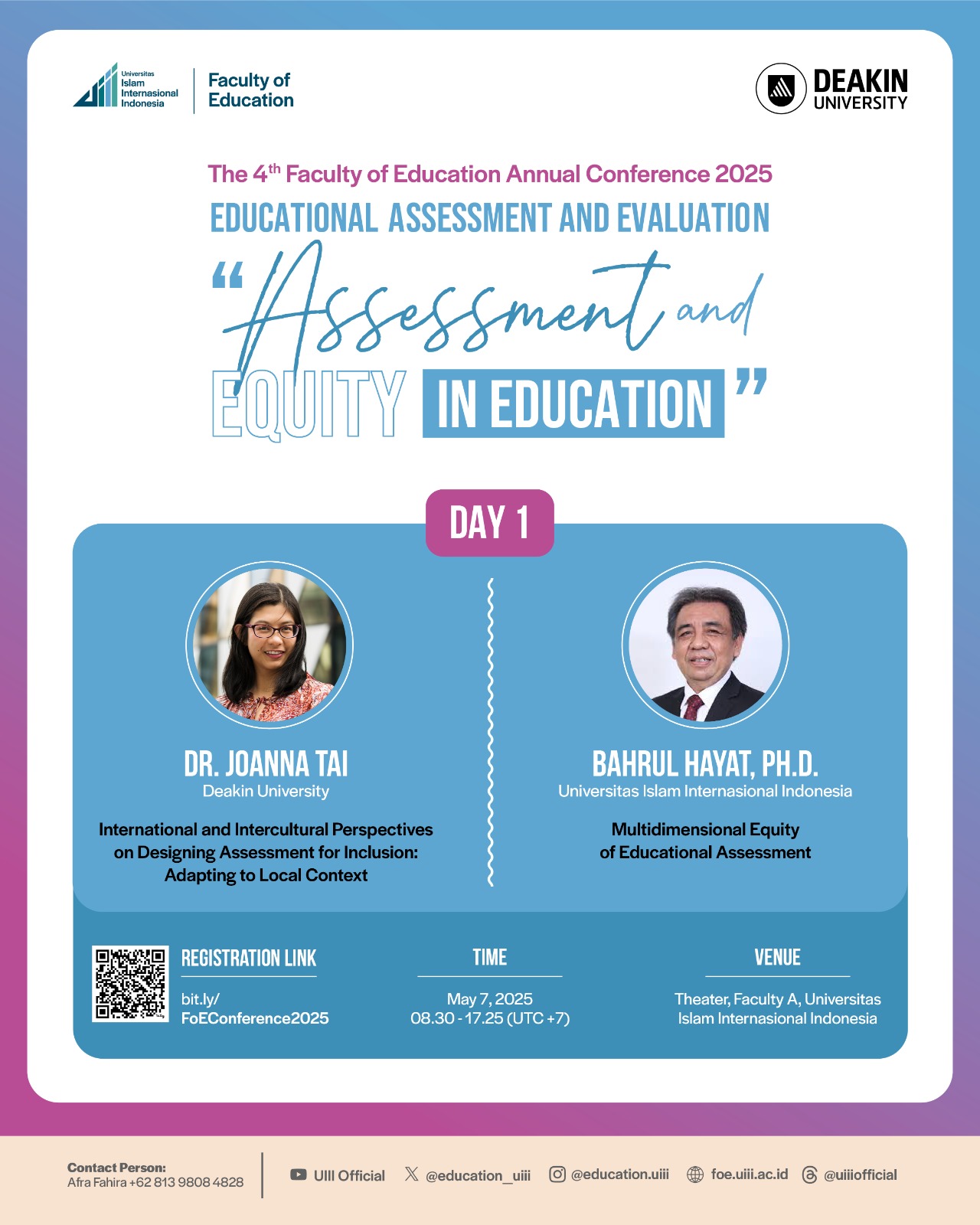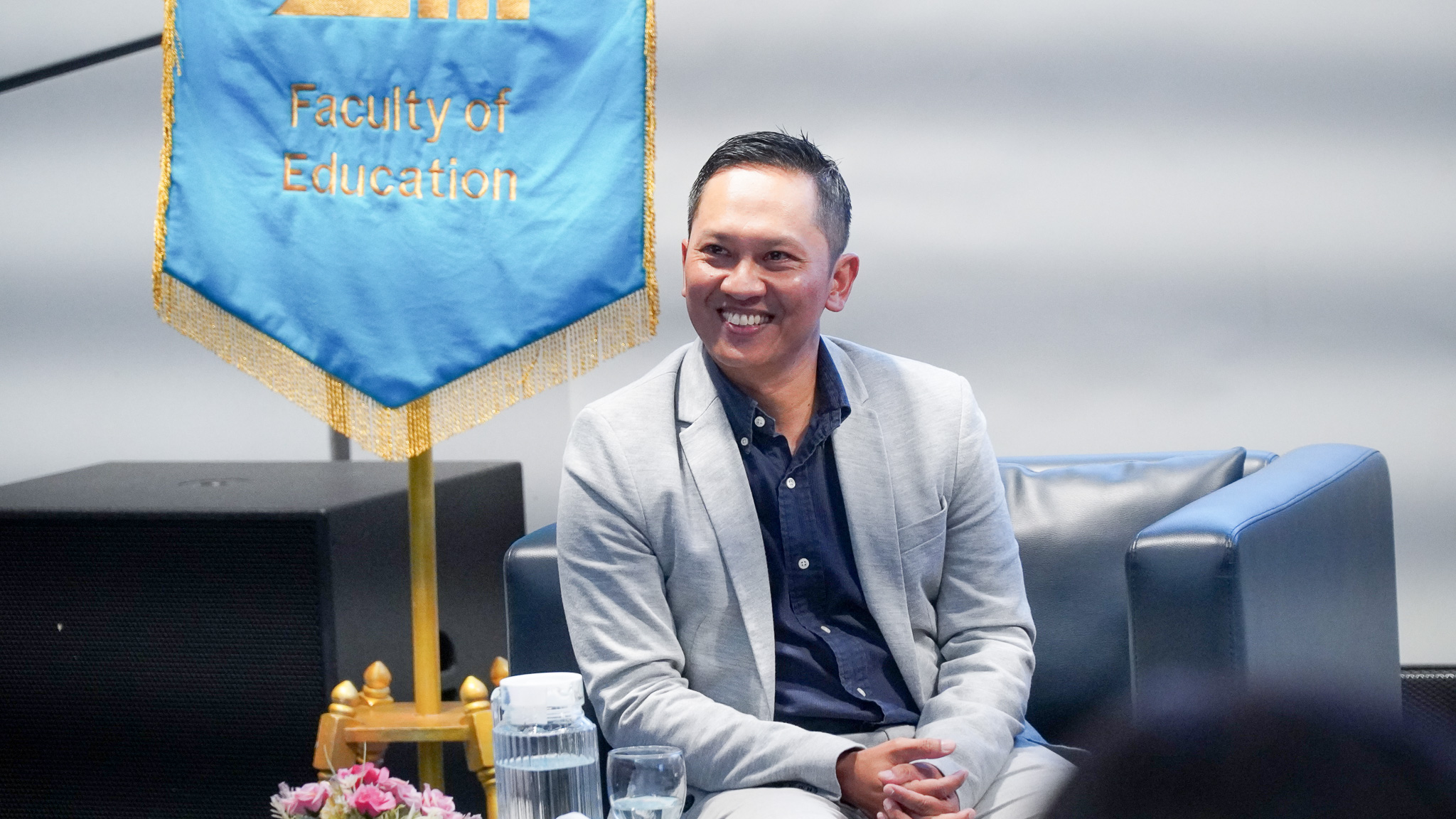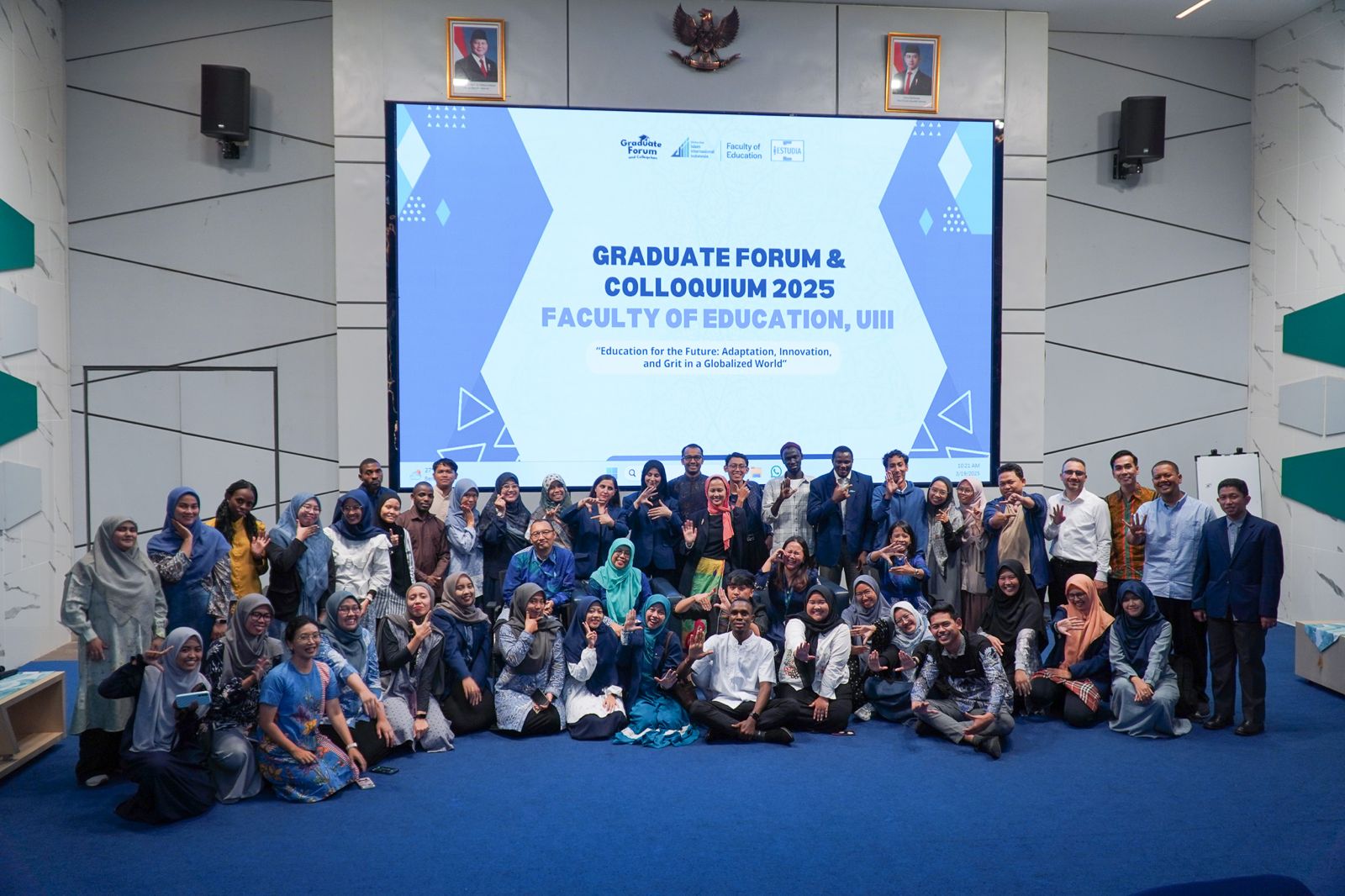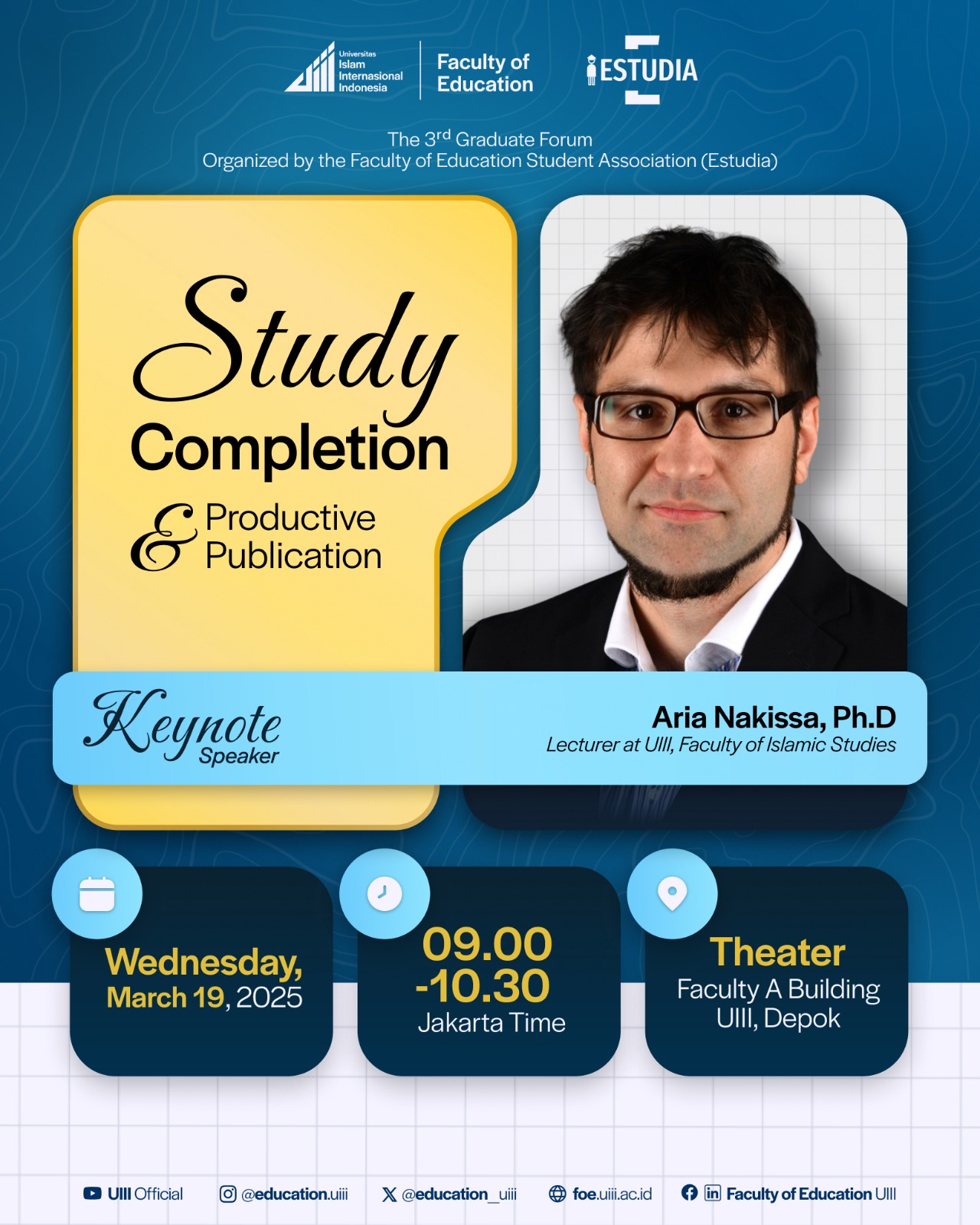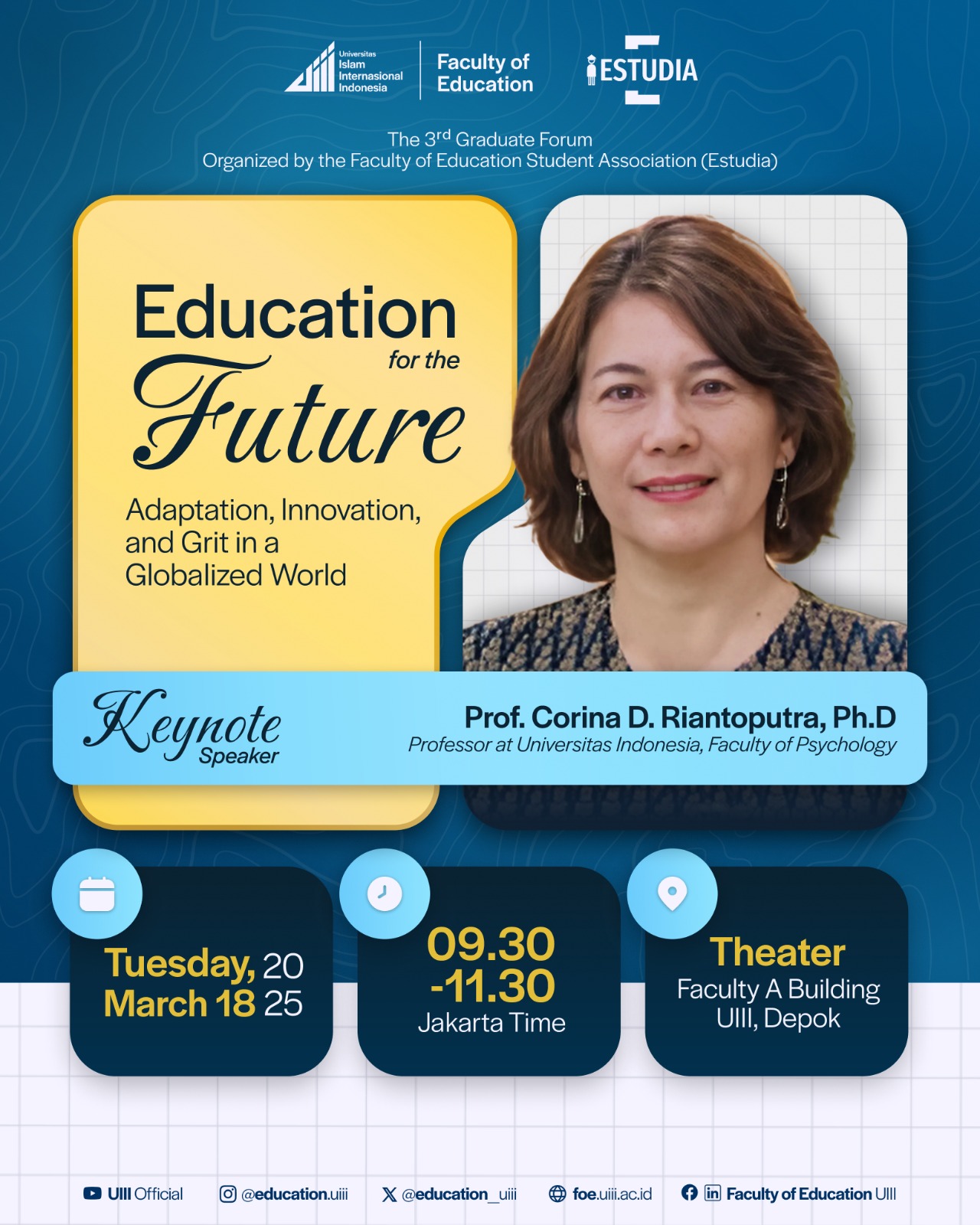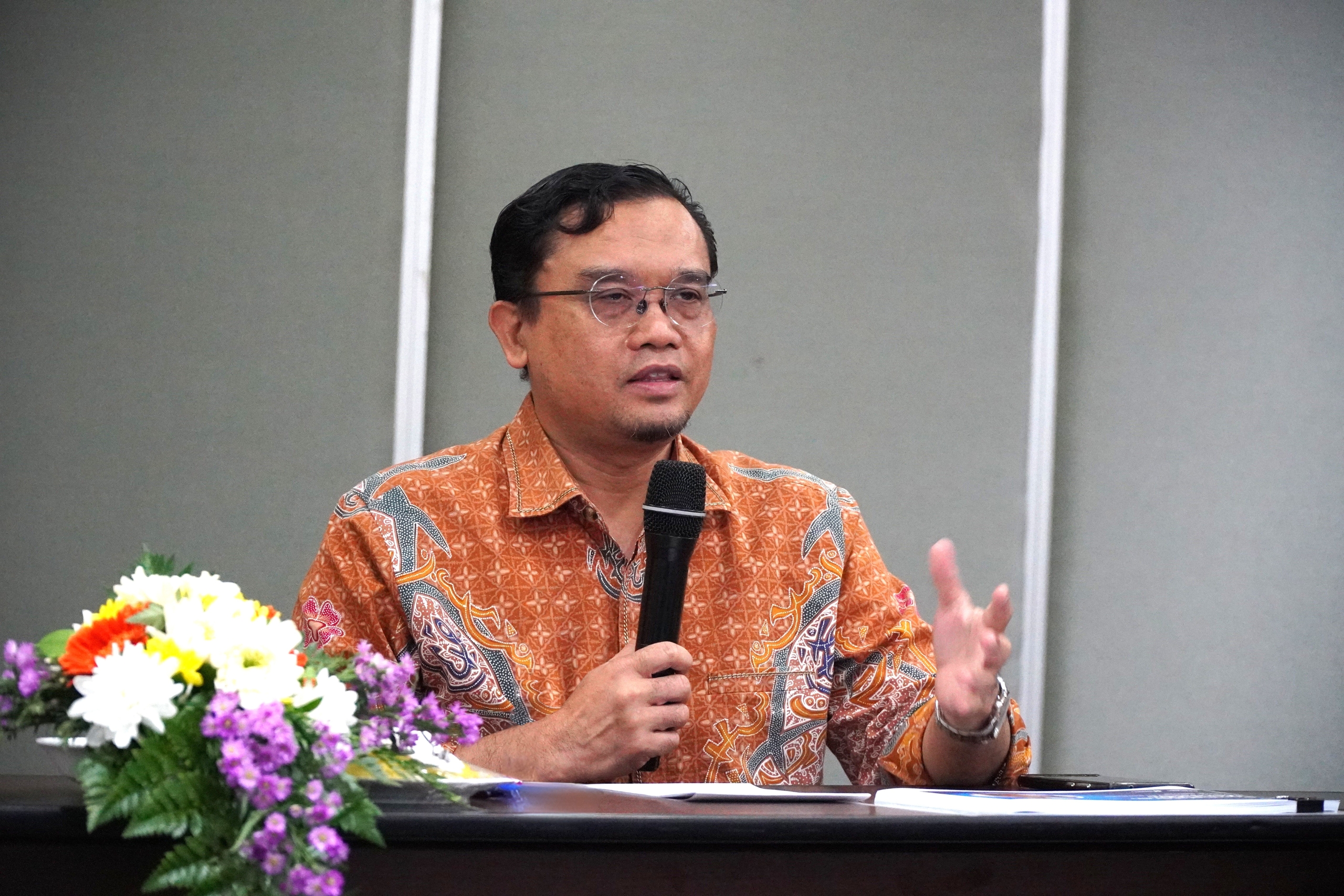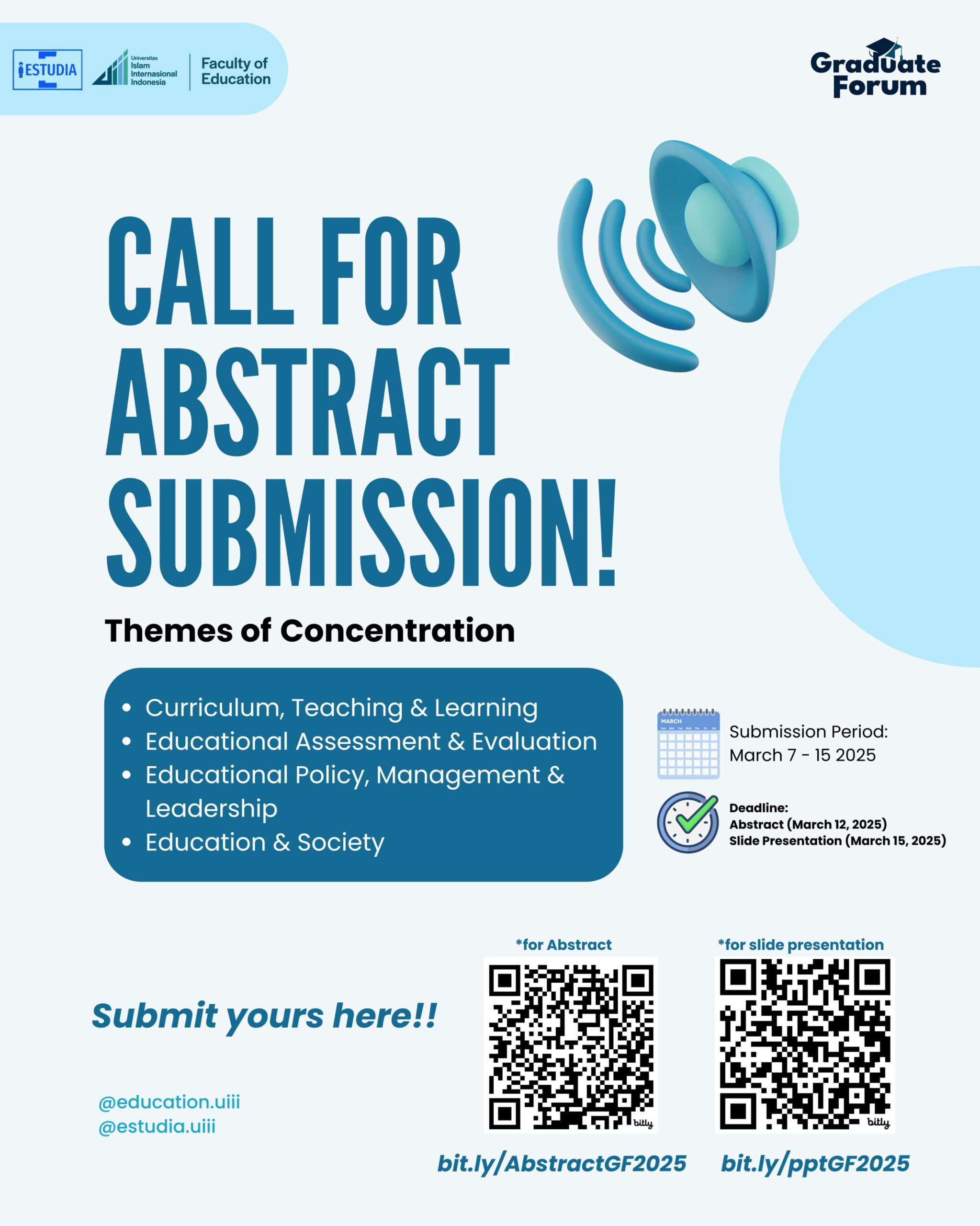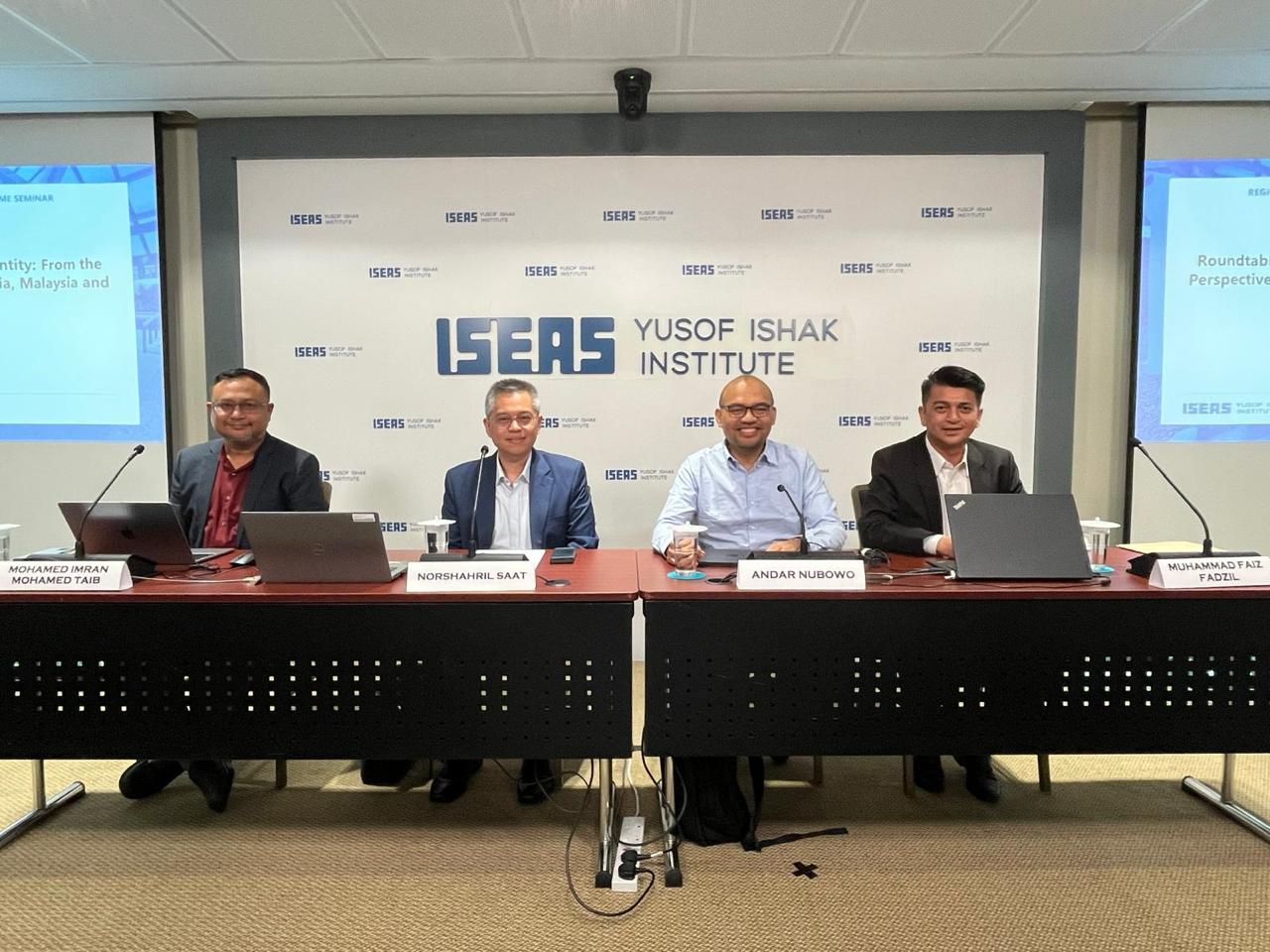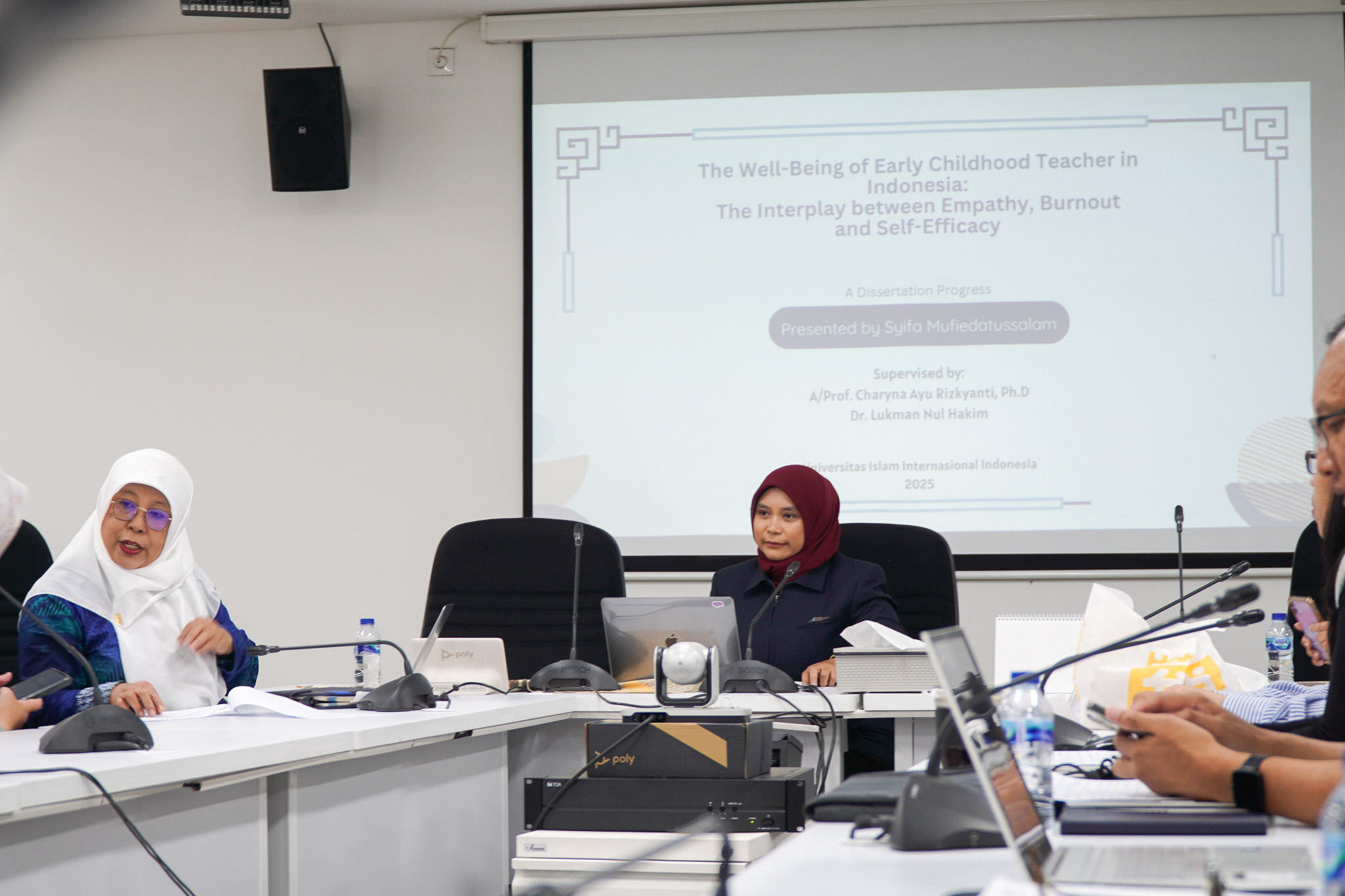Kindergarten in Lockdown: How Do Leaders Kept Learning Alive?
 Kindergarten in Lockdown: How Do Leaders Kept Learning Alive?
Kindergarten in Lockdown: How Do Leaders Kept Learning Alive?
April 8, 2025
Contributor: Virda Lalitya Umam | Editor: Supriyono | Photo: Nurul Fatimah
Continuing its commitment to fostering scholarly discussions, the Faculty of Education at Universitas Islam Internasional Indonesia (UIII) hosted its 38th LunchTalk on Tuesday, February 25, 2025. This session featured Yohan Rubiyantoro, Ph.D. from the Ministry of Primary and Secondary Education, who presented his research on how kindergarten leaders adapted to the unprecedented challenges of distance learning during the COVID-19 crisis.
In his presentation, titled ‘Case Studies of School Resilience: Kindergarten Leadership During Crisis’, Dr. Rubiyantoro highlighted the pivotal role of early childhood education leaders in ensuring learning continuity amid disruptions. He began by outlining Indonesia’s education system, emphasizing the structured yet decentralized framework that places school principals at the forefront of crisis management.
Dr. Rubiyantoro’s study focused on four public kindergartens across different regions of Indonesia, examining how school leaders, teachers, and parents navigated the abrupt shift to remote learning from September to December 2021. The findings underscored significant challenges, including limited digital literacy among teachers and students, inadequate ICT infrastructure, and socio-economic disparities affecting access to online education.
The study revealed varied responses across regions. In eastern Indonesia, many kindergartens struggled with poor internet connectivity and teachers unfamiliar with digital tools, making distance learning nearly impossible. In contrast, some schools in western Indonesia discreetly continued in-person learning, citing concerns over young children’s ability to engage with virtual lessons.
In Jakarta, rapid adaptation was evident as teachers were trained to use digital platforms and create engaging video lessons. Meanwhile, in central Indonesia, schools leaned on strong community support, collaborating with parents to develop alternative learning strategies, including home-based activities and shared educational resources.
Dr. Rubiyantoro emphasized that the success of kindergarten leaders during this crisis hinged on their ability to adapt, communicate effectively with teachers and parents, and embrace digital learning. He advocated for improved crisis management training and investment in ICT infrastructure to better equip schools for future disruptions.
As Indonesia advances in digital transformation, Dr. Rubiyantoro’s insights underscore the importance of resilient and innovative leadership in early childhood education. Through this LunchTalk session, UIII’s Faculty of Education reaffirms its dedication to preparing future educational leaders to navigate uncertainties and shape a more inclusive and adaptable learning landscape.

Grit, Innovation, and Adaptation: Key Themes in FoE’s 3rd Graduate Forum for Education Future

Grit, Innovation, and Adaptation: Key Themes in FoE’s 3rd Graduate Forum for Education Future
March 24, 2025
Contributor: Supriyono | Editor: Dadi Darmadi | Photo: Virda Lalitya Umam
The Faculty of Education (FoE) at Universitas Islam Internasional Indonesia (UIII) has successfully hosted its 3rd Graduate Forum & Colloquium on March 18-19, 2025, at the UIII Campus in Depok, West Java. Themed "Education for the Future: Adaptation, Innovation, and Grit in a Globalized World," the event convenes graduate students to explore the dynamic evolution of education.
In her opening address, Assoc. Prof. Charyna Ayu Rizkyanti underscored the forum's relevance, stating, "talking about the future—who can truly predict it? We’re witnessing the world changing very fast. However, if there’s one thing that we know for sure, education will always be at the heart of how we navigate this uncertain future,” she said.
She emphasized the indispensable role of adaptation, innovation, and grit in modern education, explaining that adaptation ensures survival, innovation drives progress, and grit fortifies resilience in the face of adversity.
Meanwhile, Prof. Nina Nurmila, Dean of the Faculty of Education at UIII, highlighted the forum's function in equipping the students for academic dissemination. She remarked, "This serves as a vital rehearsal for you—to present your research and articulate your ideas to a broader academic audience." Prof. Nurmila also emphasized the significance of timely study completion and scholarly productivity, urging students to remain diligent in their academic publications and maintain the tradition of graduating together onetime.
The forum featured two distinguished keynote speakers. On the first day, Prof. Corina D. Riantoputra, a psychology lecturer from the University of Indonesia, explored the primary theme, "Education for the Future: Adaptation, Innovation, and Grit in a Globalized World." On the second day, Aria Nakissa, Ph.D., from UIII's Faculty of Islamic Studies, presented "Study Completion and Productive Publication," aiming to inspire students and faculty members to achieve timely graduation and maintain a robust academic publication record.
Organized by the Education Student Association (ESTUDIA), the forum also marked the inauguration of ESTUDIA’s new leadership cabinet, with Mukhamad Imron Rosadi, an MA in Education student from batch 4, assuming the role of president.
The 3rd Graduate Forum & Colloquium serves as a dynamic platform for participants to engage in intellectual discourse, exchange insights, and challenge prevailing perspectives, embodying the ethos of shaping the future of education in an era of rapid transformation.
Revolutionizing Learning: Indonesia’s Bold Step Towards High-Order Thinking
 Revolutionizing Learning: Indonesia’s Bold Step Towards High-Order Thinking
Revolutionizing Learning: Indonesia’s Bold Step Towards High-Order Thinking
Contributor: Virda Lalitya Umam
In the recent aftermath of the COVID-19 pandemic, Indonesia’s education system is once again put to the test. Findings in Indonesia’s 2022 PISA (Programme for International Student Assessment) result indicate that less than 1% of Indonesia’s students are capable of answering high-order thinking skill (HOTS) questions. Addressing these concerns, Gogot Suharwoto, M.Ed., Ph.D., Director General of Early Childhood Education, Primary Education, and Secondary Education at the Ministry of Primary Education and Secondary Education asserts the need for a revolutionary approach to educational reform.
At a semester preparation workshop held by the UIII Faculty of Education on February 19, 2025, Dr. Suharwoto explores the concept of deep learning and its implementation in Indonesian education. Alongside the worrying literacy and numeracy levels of Indonesian students, persisting educational inequality exists that the looming 2045 demographic bonus could potentially worsen. In response to these dire issues, the government formulated an approach coined as Pembelajaran Mendalam (PM)—an Indonesian take on deep learning.
PM is an approach that aims to honor knowledge, students, and teachers. PM emphasizes a learning atmosphere and process that is mindful, meaningful, and joyful through holistic and integrated cultivating of ethics (olah hati), literacy (olah pikir), aesthetics (olah karsa), dan kinesthetics (olah raga). PM is not considered a standalone curriculum in itself—it complements educational approaches by adding characteristics of pedagogical practices. Moreover, although pembelajaran mendalam is a direct translation of the term “deep learning,” Dr. Suharwoto advises the audience not to use the two interchangeably, as PM is an official, technical term unique to Indonesia, as opposed to deep learning still being a concept with broad interpretations.
The PM framework is built on four pillars. Firstly, eight core characteristics that are instilled within students. Second, learning principles of PM, being mindful, meaningful, and joyful. Third, learning experiences that students should undergo, from understanding and applying to reflecting. Lastly, pedagogical practices, learning partnerships, learning environments, and digital utilization as a learning framework for instructional designs.
Dr. Suharwoto then explains that transforming educators’ roles would also be imperative to the projected implementation of PM. The current paradigm is still top-down, with the central government formulating policies to be adapted by local governments, adopted by school principals, and implemented by teachers. The stance taken by PM is that educational policies should be more centralized on the teachers since they observe the real-time implementation of such policies on a micro-scale. Recommendations from teachers would be submitted to the school principal and then forwarded to local and central governments, respectively. This format also places educators not just as mere educators but also as activators, collaborators, and cultivators of learning culture.
Although a structured learning approach might seem overly complicated for young children, Dr. Suharwoto states that with appropriate methods, PM can be implemented from an early age. For example, in early childhood education (i.e. PAUD in Indonesia), PM can take form in hands-on, play-based learning experiences, transitioning into various interdisciplinary connections that become increasingly advanced as students age. It is also worth noting that the implementation of PM is not exclusive to conventional schools, as it can be tailored for vocational studies as well as special needs education.
By creating dynamic and inclusive education, Pembelajaran Mendalam aims to equip students with the 21st-century skills necessary to traverse an uncertain future. The topic presented by Dr. Suharwoto also strikes a resemblance to a past seminar at the Faculty of Education, which featured Dr. Berry Juliandi, M.Si of the Ministry of Higher Education, Science, and Technology. Both speakers share the same sentiment—a transformational stance in Indonesia’s education is urgently needed for the future. Through this workshop, the Faculty of Education affirms its commitment to providing educators and students alike with innovative teaching strategies and inclusive learning environments.
Graduate Forum and Colloquium 2025

? CALL FOR ABSTRACT AND PPT SUBMISSION!
We are excited to invite you to participate in the upcoming Graduate Forum and Colloquium with the theme:
"Education for the Future: Adaptation, Innovation, and Grit in a Globalized World."
? Submission Period:
▪Abstract Submission: March 7-12, 2025 → bit.ly/AbstractGF2025
▪PPT Slide Submission: March 7-15, 2025 → bit.ly/pptGF2025
? Event Dates: March 18-19, 2025
We invite you to submit the abstract of your paper and presentation slides, highlighting your research and contributions to the field of education. Abstracts should align with one of the following focus areas:
a. Curriculum, Teaching, and Learning
b. Educational Assessment and Evaluation
c. Educational Policy, Management, and Leadership
d. Education and Society
? Important: Please use your UIII email to complete the submission forms.
Islam and National Identity: Dr. Andar Nubowo on Indonesia’s Moderate Islamic Framework

Islam and National Identity: Dr. Andar Nubowo on Indonesia’s Moderate Islamic Framework
By Dadi Darmadi
Singapore, 11 February 2025 — The ISEAS – Yusof Ishak Institute hosted a hybrid roundtable seminar titled “Islam and National Identity: From the Perspectives of Contemporary Indonesia, Malaysia and Singapore,” moderated by Dr. Norshahril Saat, Coordinator of the Regional Social and Cultural Studies Programme. The event featured presentations by Dr. Andar Nubowo (Indonesia), Mr. Muhammad Faiz bin Fadzil (Malaysia), and Mr. Mohamed Imran Mohamed Taib (Singapore), drawing 123 participants—researchers, policymakers, students, and diplomats—both online and in person. This article foregrounds Dr. Andar Nubowo’s analysis of Indonesia’s Islamic identity, enriched by his extensive academic and professional background, alongside insights from his counterparts.
Dr. Andar Nubowo, a lecturer at the Faculty of Education, Universitas Islam Internasional Indonesia (UIII), and the newly appointed Executive Director of the Maarif Institute for Culture and Humanity as of May 2024, brought a wealth of expertise to the discussion. Born on 12 May 1980 in Wonosobo, Indonesia, Dr. Andar earned his Master’s degree in Political Science from École des Hautes Études en Sciences Sociales (EHESS) in Paris (2008) and completed his PhD at École Normale Supérieure (ENS) Lyon in December 2023.
Indonesian National Identity
In his presentation, Dr. Andar provided a historical and contemporary analysis of Islam’s integration into Indonesian national identity. He noted that Southeast Asia has traditionally been viewed as peripheral to the Middle East, long considered the center of Islamic learning. However, he argued that the Reformasi movement of 1998 catalyzed a shift, with Indonesian elites seeking to reposition Indonesian Islam as a significant contributor to global Islamic thought, rooted in local traditions. Tracing Islam’s dissemination in the Malay world from the 13th to 15th centuries—aligned with the decline of the Andalusian Islamic empire and the rise of Sufism—Dr. Andar highlighted the late 19th-century establishment of independent Islamic schools by reformists, diverging from Middle Eastern-influenced pesantren.
The 1990s marked a further evolution, as progressive Muslim intellectuals advocated a moderate Islam contextualized within Southeast Asia. This led to the pribumisasi Islam (indigenization) movement in the 2000s and the embrace of wasatiyyat Islam (moderate Islam) as a national identity framework. Dr. Andar pointed to the Universitas Islam Internasional Indonesia, established under former President Joko Widodo, as a key institutional effort to position Indonesia as a hub for Islamic learning. He concluded that embedding wasatiyyat Islam into social, political, and economic policies is essential for its sustained relevance, a theme consistent with his research on moderate Islam’s soft power diplomacy.
Malaysian and Singaporean Perspectives
Mr. Muhammad Faiz bin Fadzil offered a Malaysian perspective, focusing on Prime Minister Anwar Ibrahim’s Madani framework, which integrates six core values—sustainability, prosperity, innovation, respect, trust, and compassion—to address national unity, economic revival, and political reform. He cited data showing Malaysia’s National Integration Index rising from 0.5 in 2023 to 0.6 in 2024, alongside an improved Global Peace Index ranking from 19th to 10th. Emphasizing wasatiyyah (moderation) as a governance principle, he pointed to initiatives like the Madani Lecture Platform and the “Imam Al-Nawawi’s 40 Hadith” module, while noting challenges such as identity politics.
Mr. Mohamed Imran Mohamed Taib addressed Singapore’s context, examining the Muslim religious elite’s “strategic ambivalence” toward secularism. Defining secularism as the separation of religious and state institutions, freedom of belief, and equal treatment across faiths, he observed its lack of a direct Islamic equivalent. In Singapore, traditionalist skepticism—partly influenced by Malaysia’s Islamist critiques—coexists with pragmatic acceptance of secularism’s role in a multi-religious society.
Nationalism and Global Context
The Q&A session explored nationalism versus the global Muslim ummah, perceptions of secularism, and Islam’s varying national expressions. Dr. Andar, drawing on his leadership within Muhammadiyah’s intellectual networks (e.g., Jaringan Intelektual Muda Muhammadiyah), stressed that while Islam is central to Indonesian identity, its political exploitation must be avoided—a view echoed by his peers. His recent work, such as “Covid-19, Fatwas, and Socio-religious Praxis” (Social Sciences and Missions, 2022), reflects his broader engagement with Islam’s societal role, reinforcing his seminar arguments.
Dr. Andar’s contribution, underpinned by his academic credentials—including awards like the “Bourse d’Islamologie” (2023) and “UIII COMPOSE Writing Fellowship” (2022)—and his leadership at the Maarif Institute, highlighted Indonesia’s deliberate crafting of a moderate Islamic identity. Alongside the Malaysian and Singaporean perspectives, his analysis provided a comparative lens on Islam’s intersection with national identity in Southeast Asia.
Credit: ISEAS – Yusof Ishak Institute
FoE Holds Dissertation Progress Forum for First Batch PhD Students

FoE Holds Dissertation Progress Forum for First Batch PhD Students
February 14, 2025
Contributor: Supriyono | Editor: Dadi Darmadi | Photo: Nurul Fatimah
The UIII Faculty of Education (FoE) recently organized a Dissertation Progress Forum, specially designed for the first batch of PhD students who are currently undergoing data collection. This initiative aims to provide students with a structured timeline and a supportive environment as they progress through their research.
“PhD can be a lonely journey. The aim of this forum is to make you feel that you are not alone, you are being accompanied by your friends and supervisors,” said Prof. Nina Nurmila, the Dean of the Faculty of Education. She emphasized the importance of collective academic growth and peer support throughout the dissertation journey, whilst ensuring that everyone stays on track towards timely graduation.
“We plan to have the dissertation progress seminar every semester,” said Prof. Nina. “It’s essential for PhD students to see each other’s progress and to seek help when needed. We want to create a support system where students can break down their research timeline into smaller, manageable milestones.”
Prof. Nina also stressed the significance of consistent writing and maintaining momentum throughout the dissertation process. She shared personal experiences about balancing academic life and family responsibilities, particularly for those juggling parenthood and research.
Dr. Bambang Sumintono, Head of the PhD Programs, also shared insights on the importance of structured research progress and maximizing academic opportunities. “We structure this seminar to ensure that students present their progress at different stages—midway, near the end, and at the final stage. This helps students stay on track with their writing and research goals,” he explained.
Dr. Bambang also encouraged students to present their research in the forum concisely, emphasizing that a skill that a researcher must have is to explain their research in a simple and short way. “We also expect critical questions, as this is common in academic settings. Learning to respond to scepticism is part of becoming a strong researcher,” he said.
The seminar aligns with the Faculty of Education’s tradition of fostering a strong academic community where students support each other. “We want students to graduate together. No one should not be left behind,” Prof. Nina emphasized. “Each batch should progress as a cohort, helping one another along the way.”
The Dissertation Progress Seminar will continue to be a recurring event at UIII’s Faculty of Education, ensuring that PhD students remain engaged, motivated, and supported throughout their research journey.
By providing structured guidance and fostering a collaborative academic atmosphere, the Faculty of Education is committed to helping students achieve success in their doctoral studies.


